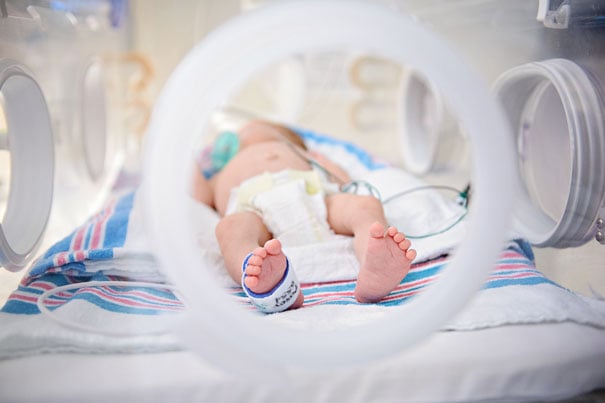A day in the life of those working in the neonatal intensive care unit (NICU) compares to a rollercoaster ride, with many highs, lows, turns and twists every day. Expecting the unexpected is the norm rather than the exception. Every baby admitted to the NICU has unique circumstances that require highly specialized, individualized care.
The caregivers, whether neonatologists, nurse practitioners, nurses, physical therapists or other specialists, are trained to quickly assess a baby’s condition and provide immediate medical intervention specific to the baby’s needs.
NICU teams exert every ounce of emotional and physical strength to deliver optimal care to premature and critically ill infants. However, they aren’t alone in their tireless efforts. Behind the scenes, researchers, scientists, physicians, professors and various medical professionals work diligently to unveil new methods of improving patient outcomes.
The science behind the NICU
From medications, new technologies and best care practices to the effects light and noise exposure, nutrition and the human touch have on NICU babies, advancements in the NICU are made possible by research, education, quality and safety initiatives.
Every day, Pediatrix® Medical Group clinicians and medical professionals care for more than 5,300 NICU babies in more than 360 hospitals nationwide. An essential aspect of providing highly specialized care to these neonates is the ability to conduct various studies that drive medical progression and quality improvement.
The Pediatrix® Center for Research, Education, Quality and Safety (CREQS) has been on a 25-year quest to discover, understand and teach health care practices that enrich the lives of patients and their families.
Pediatrix CREQS
When established in 1997, CREQS opened countless opportunities for ongoing medical progression and process enhancement across the women’s, babies’ and children’s continuum of care through:
- Research — Discovering medical advancements that help save lives, avoid morbidities, decrease mortalities and enhance quality of life.
- Education — Instructing thousands of clinicians and nurses worldwide on the latest methods for treating patients, industry best practices and current medical guidelines.
- Quality and Safety — Leading myriad national quality-improvement and safety initiatives across various subspecialties to enhance patient care.
Pediatrix has sponsored numerous clinical research projects, investing millions of dollars during the last 20 years. The company has collaborated with several hospitals and universities to enroll nearly 20,000 patients in neonatology, maternal-fetal medicine, cardiology and anesthesia studies deemed instrumental in discovering health care innovations and robust quality methods.
Among the team’s notable works is the 100,000 Babies Campaign, intended to decrease NICU morbidity and mortality cases.
The 100,000 Babies Campaign
In 2007, Pediatrix neonatology teams, in collaboration with hospital partners, launched the ground-breaking 100,000 Babies Campaign to identify ways to evolve NICU care. The initiative focused on five clinical issues believed to have the highest impact on patient outcomes:
- Nutrition,
- Medication usage and dosing,
- Central line-associated bloodstream infections (CLABSIs),
- Mechanical ventilation,
- Suboptimal body temperature.
Because the first several years yielded substantial results in NICU process improvements and patient outcomes, the 100,000 Babies Campaign remains an ongoing program for Pediatrix. From 2007 to 2020, the lives of an estimated 8,969 Pediatrix-affiliated NICU babies have been saved due to improvements made in neonatal intensive care processes and practices.
During the same period, outcomes for very low birth weight neonates — 3.31 pounds or less — proved remarkable. The following statistics represent an estimate of lives saved and morbidities avoided in a single hospital based on advancements in NICU care:
- 2,175 lives saved,
- 2,614 necrotizing enterocolitis (NEC) cases avoided,
- 1,230 fewer chronic lung disease/bronchopulmonary dysplasia (CLD/BPD) instances,
- 13,264 fewer infants on mechanical ventilation,
- 9,243 fewer late-onset sepsis events,
- 3,704 fewer patent ductus arteriosus (PDA) ligation occurrences,
- 30% increase in the early use (zero to six days) of human milk,
- 693 fewer severe intraventricular hemorrhage (IVH) cases,
- 1,454 severe retinopathy of prematurity (ROP) cases avoided,
- 6,753 neonates arrived in the NICU with a body temperature above 36.5⁰C (97.7⁰F),
- 30% decrease in hypothermia upon NICU admission.
A sizeable decrease in medication usage for very low birth weight was realized as well:
- 8,669 infants avoided Ampicillin usage,
- 10,469 infants avoided Vancomycin usage,
- 18,645 infants avoided gastroesophageal reflux (GER) medications.
NICU research: An unwavering priority
Pediatrix’s mission to “take great care of the patient, every day and in every wayTM” isn’t a marketing ploy or an empty promise. The 100,000 Babies Campaign is only one of hundreds of Pediatrix CREQS initiatives designed to unearth viable methods of elevating patient care, outcomes and quality of life.
Pediatrix clinicians have published nearly 200 peer-reviewed papers focusing on various pediatric subspecialties and women’s health care. These physicians and medical professionals don’t stop at providing exceptional care to patients and their families; they also work behind the scenes to help facilitate medical progression and quality improvement.
Want to learn more about NICU advancements? Check out Sixty years of neonatal intensive care: We’ve come a long way baby!
